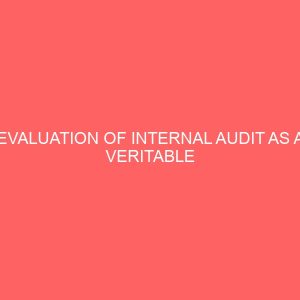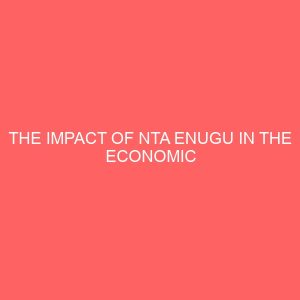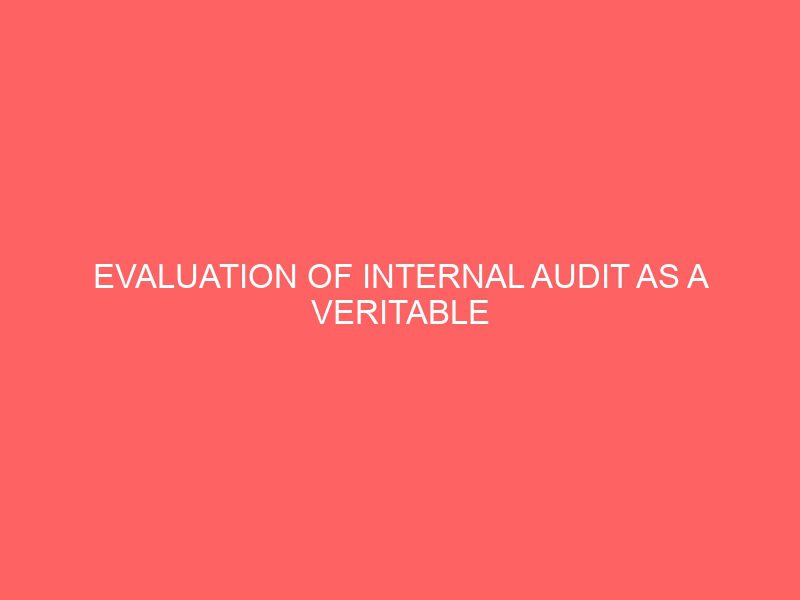Description
THIS RESEARCH WORK IS ON EVALUATION OF INTERNAL AUDIT AS A VERITABLE CONTROL MACHINERY FOR EFFICIENT MANAGEMENT IN PUBLIC ENTERPRISES.
ABSTRACT
This research is conducted to emphasize the essence of internal audit as a veritable control machinery in public organizations drive to improve on their managerial efficiency. This is achievable through the employment of relevant research techniques to obtaining necessary information from the sample population upon which in-depth analysis will be made to highlight the significance of internal audit as a potent machinery of internal control in public enterprises with which the efficiency of management can be raised. For the purpose of this study, questionnaires were administered which were properly filled and returned from the internal audit personnel’s of the Lagos branch of the Nigerian television authority (NTA). Findings revealed that internal audit efficiency is relevant for improvement on the managerial performances in public enterprises. Besides, this study also reveals certain practical factors that will lead to internal audit inefficiency in public enterprises. This finding will help management of public enterprise place more priority on their internal control and audit apparatus to improve on their management performance and public image.
CHAPTER ONE
INTRODUCTION
1.1 BACKGROUND TO THE STUDY
The’ term management was coined from the Italian word “managgiare” which connotes ‘to train horses’. It was originally used to indicate the process of training or coordinating sporting activities. Later its application was extended to the operations of government and businesses.
Akpala (2001) describes management as the process of combining and utilizing organization’s inputs (men, materials, money and’ machine) by the mix of planning, organizing, directing and controlling activities for the purpose of producing outputs (usually goods and services), desired by the customers, so that the organization’s objectives are accomplished. In the definition given above, it is worthy of inference that control is an essential tool of management. The term control was rightly described by Lucey (1990) as “a systematic effort by business management to compare performance with predetermined standards, plans or objectives to ensure that performance is in line with standard and also to take remedial action required so that human and other corporate resources are employed in the most efficient and profitable manner.
Control system is very essential in any organization be it a private or a public establishment/sector in order to check how effective and efficient they are in maximizing the use of resources. One of the measures commonly used to minimize wastage and guide plans to their eventual accomplishment is Internal Auditing.
Embezzlement, misappropriations, fraud and wastage of resources have been the characteristics of government ministries and public enterprises. Based on the literatures and daily experiences, one could conclude that there is a fairly unanimous feeling of dissatisfaction with the performance of most Nigerian public enterprises to date.
Internal auditing has been defined by Adelaja (2000) as “an independent appraisal of activity within an organization for the review of operations as a service to management. It is a form of a managerial control which functions by measuring and evaluating the effectiveness of other controls”. This project seeks to find out if the internal audit department exists in these enterprises and if it does, in what way has it contributed to the efficient management of such enterprise. It is not possible to sample all the public enterprises in Nigeria therefore the main focus of this project is on the Nigeria Television Authority (NTA), Lagos branch.
1.2 STATEMENT OF PROBLEM
Ogunjimi (2001) while writing on accountability in the Nigerian publicenterprise observed that in the course of government’s involvement in the economic and social aspects of the ‘nation’s development; public enterprises now play a vital role in the development process and since these public enterprises handle high proportion of government fund, proper account of stewardship are needed. It is also important to note that established controls to ensure proper accounts of operation have been grossly abused by lack of accountability and stories of woe on the performance of such enterprises. Despite the controls installed, irregularities, embezzlement, misappropriation of public funds, fraud and gross wastage of resources-are still the order of the day in the public enterprises.
The internal audit department exists so as to reduce organizations’excesses such as financial mismanagement and lack of proper accountability to the barest minimum even if it cannot be completely eliminated. Internal audit which is supposed to serve as a control tool sometimes becomes ineffective due to some inbuilt factors that impair its independence and thus hinder its efficiency.
1.3 STATEMENT OF OBJECTIVE
The purpose of this project is to critically evaluate internal audit as a control tool for efficient management in Nigerian public enterprises using the Nigeria Television Authority, Lagos branch as a case study.
1.4 STATEMENT OF RESEARCH QUESTIONS
The following questions are to be answered in the course of this study:
(1) What factors hinder internal audit efficiency in Nigerian public enterprises?
(2) Does good internal audit practice improve managerial performance in Nigerian public enterprises?
(3) Why have the established controls failed to enhance the managerial performance in the Nigerian public enterprise?
1.5 STATEMENT OF THE HYPOTHESIS
The following are the statement of hypothesis to be utilized for the study and they include:
(A) Ho: Internal audit practice do not improve managerial performance in Nigerian public enterprises.
H1: Internal audit practice Improve managerial performance Nigerian public enterprises.
(B) Ho: There are no factors that hinder internal audit efficiency inNigerian public enterprises.
H1: There are factors that hinder internal audit efficiency in
Nigerian Public enterprises.
(C) Ho: All established controls have not failed to enhance the Managerial performance in the Nigerian public enterprises.
H1: All established controls have failed to enhance the managerial performance in the Nigerian public enterprises.
1 .6 SIGNIFICANCE OF THE STUDY
Given the necessary role that the internal audit department plays in public enterprises and the seeming ignorance of the employees as to their contribution to this department and to the efficient management of such enterprises, makes this study essential. It is therefore necessary to enquire into the relationship among the internal audit department, employees and the management team as these three groups are supposed/expected to carry on activities directed towards the enhancement of the worth or value of their enterprise.
This study will also confirm or discredit the belief of some people that internal audit is not necessary in the public enterprise.
Also, this study will make insight into the deficiencies in the current internal audit practices and will therefore be useful to those who are at the helm of affairs in the country.
Finally, it is hoped that this study will serve as a launching pad for researchers who may like to carryout research on similar area of study.
1.7 SCOPE AND LIMITATION OF THE STUDY
This is the case study of Nigeria television authority- Lagos; and as such the outcome of the study may not be of universal application. This enterprise has been chosen due to the prominent role which it is expected to play in the life of the average Nigerian. This study is expected to be constrained by time, money, non release of questionnaires and the respondent attitude to revealing vital information.
1.8 DEFINITION OF TERMS
A. CONTROL: This is the ability influence others in order to achieve a common purpose.
B. INTERNAL AUDIT: This is a review of operations and records, sometimes continuous, undertaken within a business by specially assigned staff.
C. INTERNAL AUDITING: An independent appraisal of activity within an organization for the review of accounting, financial and other operations as a basis for service to management in order to measure and evaluate the effectiveness of other controls.
D. INTERNAL CHECK: This is the allocation of authority and work in such a manner as to afford checks on the routine day-to-day work by means of the work of one person being proved independently by another or the work of one person being complimentary to that of another.
E. INTERNAL CONTROL: This is defined as not only internal check and internal audit but the whole system of controls, financial and otherwise, established by the management in order to carry on the business of the company in an orderly manner, safeguarding its assets and secure as far as possible the accuracy and reliability of records.
F. MANAGEMENT: The process of planning, organizing, leading and controlling the efforts of organization’s members and of using all other organizational resources to achieve stated organizational goals.
REFERENCES
Adelaja, S. O. (2001).Principle of Auditing. Lagos: Distance Learning Institute. Pp.35
Akpala, A. (2001.Princtpies of Management-A Nigeria approach Enugu: Fourth dimension publishers limited.
Lawal, A. A. (2003) Management in focus Lagos: Adeola printing Press Limited.
Management Information System. Lagos: University of Lagos, class note.
Omileke, “Internal control-internal audit: Panacea for corporate growth and survival Nigerian Accountant, Vo1.36 No.4 (October\December 2003). pp 22- 23.








Reviews
There are no reviews yet.